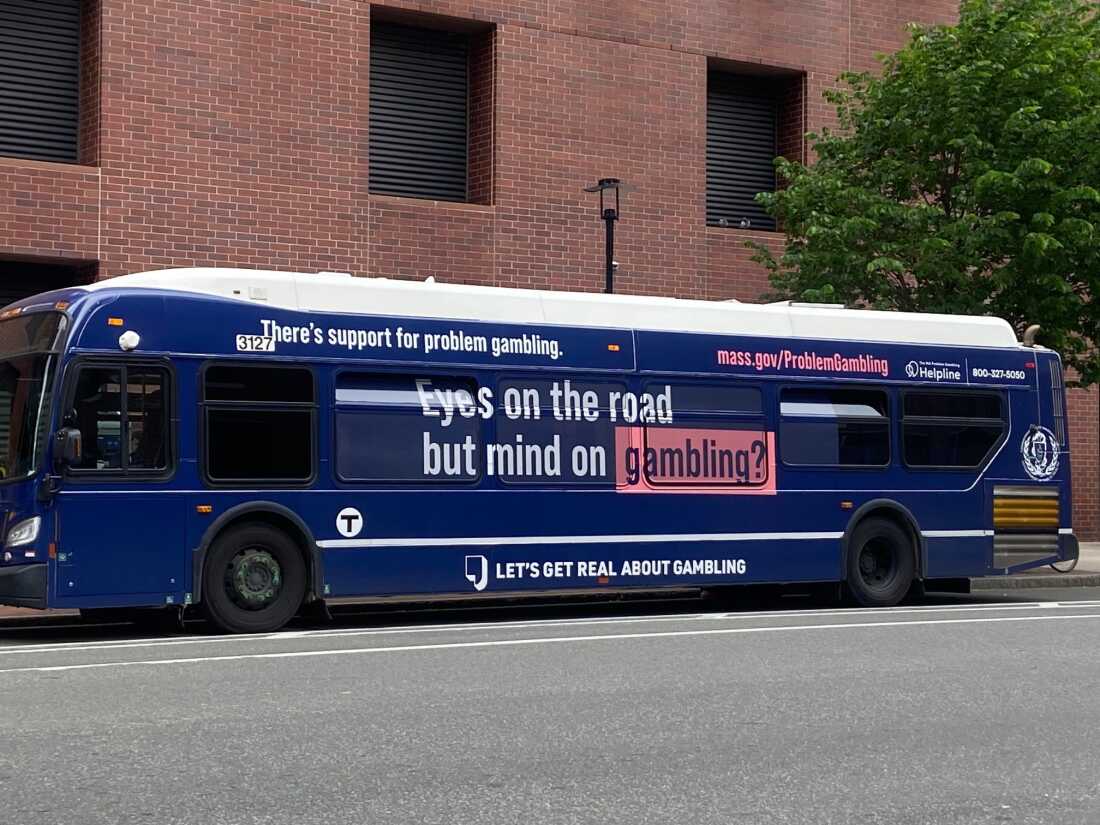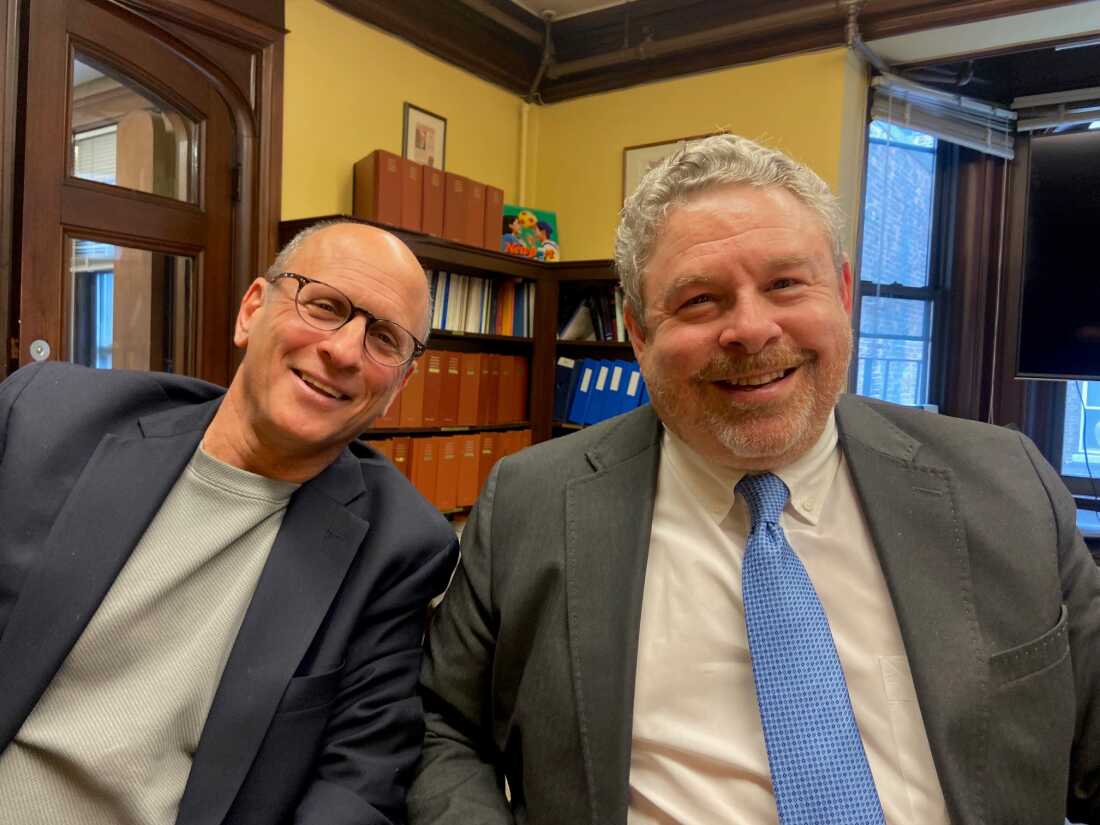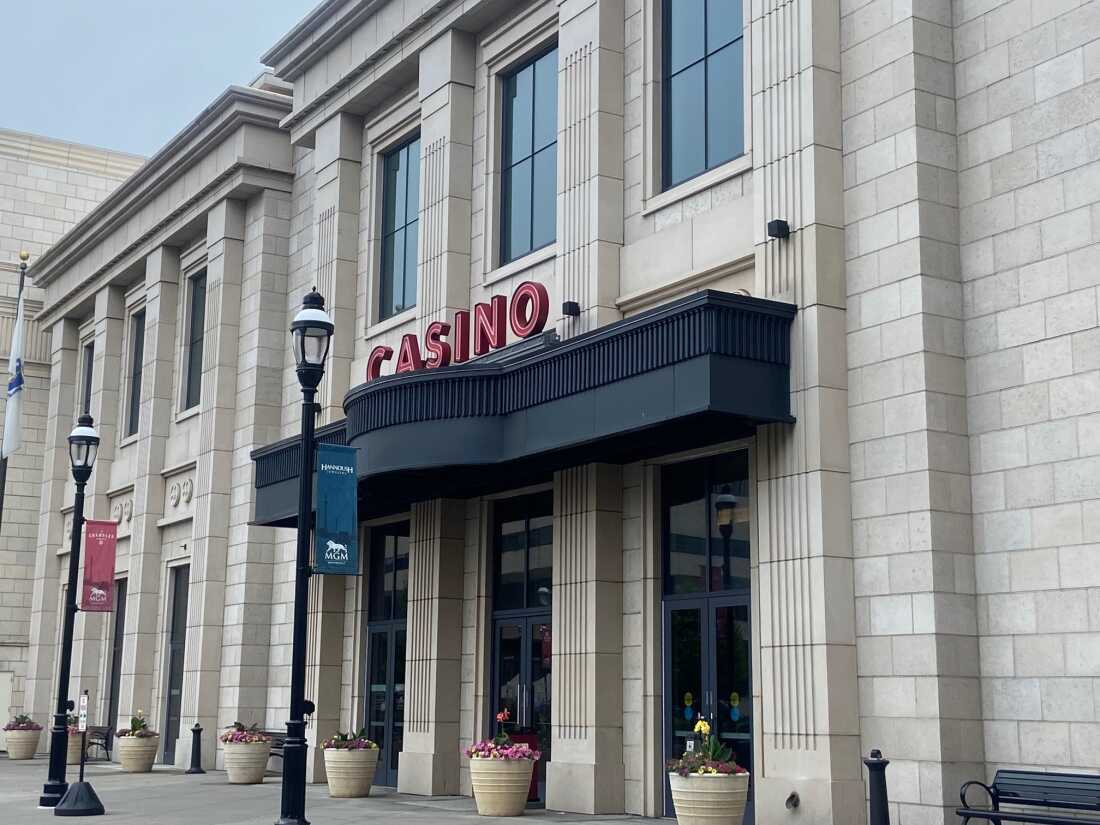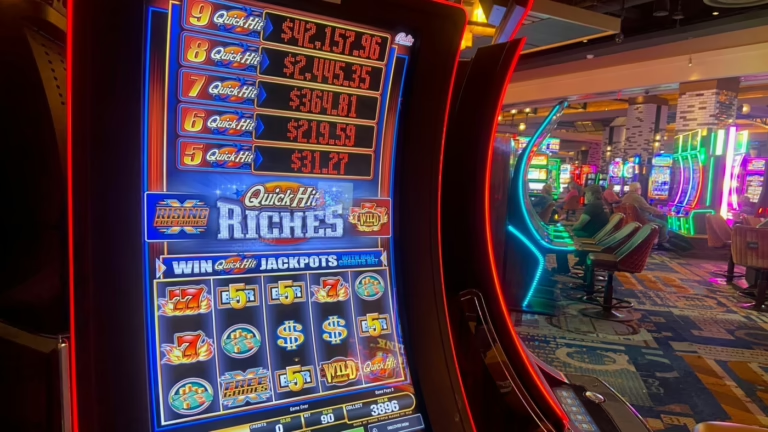A slot machine located on the MGM Springfield casino floor in Springfield, Massachusetts.
Karen Brown/NEPM
hide caption
toggle caption
Karen Brown/NEPM
Encouraging responsible gambling and financial restraint within the vibrant, sensory-rich environment of a casino is a challenging task.
Yet, this is precisely the mission undertaken daily by Massachusetts state employees amidst the constant chimes and dazzling lights of slot machines.
At MGM Springfield, located in western Massachusetts, these staff members, identifiable by their green polo shirts, are stationed just off the bustling casino floor near a modest office space.
Above their workspace, a sign proclaims “GameSense,” the state’s flagship initiative aimed at reducing gambling-related harm.
A digital display cycles through reminders such as, “Enjoy sports betting responsibly. Set a budget and adhere to it.”
These workers distribute complimentary items like luggage tags and travel-sized tissues to invite patrons into conversation.
When successful, they provide brochures featuring the state’s gambling helpline and website, and can even assist individuals in enrolling in “Play My Way,” a program that enables users to establish monthly gambling expenditure limits.
Beyond the casino walls, GameSense extends its reach through social media campaigns and advertisements on sportsbook platforms. Concurrently, the Massachusetts Department of Public Health promotes responsible gambling messages on public transit and billboards.
“This has been a significant evolution over the past 12 years,” remarks Mark Vander Linden, who manages the GameSense program in Massachusetts.
Since the opening of the state’s first casino in 2015, Massachusetts has developed a comprehensive “responsible gaming” framework, financed by a surtax on gambling industry revenues.

A digital advertisement promoting GameSense, Massachusetts’ responsible gambling program, shown on a screen inside MGM Springfield casino.
Karen Brown/NEPM
hide caption
toggle caption
Karen Brown/NEPM
Initially, state regulators focused on educating gamblers about the risks and addictive nature of gambling through informational brochures explaining game odds.
“The early efforts centered on ensuring that players had access to materials detailing the probabilities involved in each game,” Vander Linden explains.
As the gambling sector expanded, including the rise of sports betting, Massachusetts implemented stricter rules: betting on in-state college teams is prohibited, credit card gambling is banned, and all operators must offer voluntary spending limits and self-exclusion options that restrict access for specified durations.
The U.S. lacks a unified national gambling framework unlike other nations
While some states have adopted measures to mitigate gambling addiction, many have minimal regulations. Without a federal gambling authority or cohesive national policy, each state independently governs its gambling industry.
Increasingly, experts and policymakers advocate for more assertive and coordinated actions to address gambling addiction, especially following the 2018 Supreme Court decision that legalized sports betting in many states, fueling rapid industry growth now legal in 39 states. Nearly all states (48) permit some form of gambling, including lotteries.
Internationally, countries have taken more comprehensive regulatory approaches that U.S. advocates view as potential blueprints.
For instance, Norway maintains a government monopoly on slot machines, controlling game types and capping monthly losses at 20,000 kroner (approximately $2,000) per gambler.
In the United Kingdom, a £5 (around $7) limit per slot machine spin has been introduced, alongside a 1% industry levy funding gambling disorder treatment and prevention programs.

A Boston city bus displays a public service announcement encouraging responsible gambling.
Karen Brown/NEPM
hide caption
toggle caption
Karen Brown/NEPM
Earlier this year, a study published in The Lancet urged global health authorities to implement swift regulatory measures to prevent gambling disorders from becoming widespread and more difficult to control.
However, U.S. policymakers face challenges due to a general reluctance toward corporate regulation, particularly during the Trump administration, raising concerns about the public health risks posed by the proliferation of mobile sports betting apps that enable gambling anytime, anywhere.
Concerns rise that increased gambling availability fuels addiction
Before the surge of online and mobile gambling, research estimated that 1% to 2% of Americans suffered from gambling disorders, with an additional 8% at risk.
Some lawmakers worry these numbers will escalate.
Connecticut Senator Richard Blumenthal, a Democrat, notes, “The complexity and sophistication of betting options have grown tremendously, underscoring the need for safeguards that empower individuals to refuse participation.”
Blumenthal supports the SAFE Bet Act, a federal bill proposing uniform standards for sports betting operators.
The legislation includes provisions such as banning gambling advertisements during live sports broadcasts, mandatory affordability assessments for high-spending bettors, restrictions on exclusive VIP programs, prohibitions on AI-driven marketing tracking, and the establishment of a national self-exclusion registry.
“States lack the resources and jurisdiction to shield consumers from aggressive and sometimes deceptive marketing tactics,” Blumenthal asserts.

Slot machines on the MGM Springfield casino floor.
Karen Brown/NEPM
hide caption
toggle caption
Karen Brown/NEPM
The gambling sector strongly opposes the SAFE Bet Act. Joe Maloney, spokesperson for the American Gaming Association, describes federal standards as a “direct challenge” to state regulators.
“Such measures risk undermining state authority and could stagnate industry growth,” Maloney warns.
Industry’s ‘responsible gaming’ approach differs from public health strategies
Maloney argues that new regulations are unnecessary, emphasizing the industry’s acknowledgment of gambling addiction through its “responsible gaming” campaigns.
These efforts include public warnings on buses and billboards advising players to stop when gambling ceases to be enjoyable and reminding them of the low odds of winning.
“Our messaging is clear: ‘You will lose money here,'” Maloney states.
He admits the industry does not track whether these initiatives reduce addiction but contends that restricting gambling options drives players toward illegal markets.
Conversely, public health experts criticize the industry’s model as ineffective.
“Regulation is essential when the industry fails to self-monitor adequately,” says Harry Levant, director of gambling policy at Northeastern University’s Public Health Advocacy Institute in Boston.
Levant highlights that the industry’s approach unfairly places the entire burden on individuals struggling with gambling addiction.
“Telling someone battling addiction to simply stop is unrealistic,” Levant explains.
Drawing from personal experience, Levant is a recovering gambling addict and former attorney who was convicted in 2015 for misappropriating client funds to support his gambling. Since then, he has become an advocate for stronger regulations and a certified addiction counselor.

Harry Levant (left) and Mark Gottlieb of the Public Health Advocacy Institute at Northeastern University in Boston, championing enhanced gambling regulations nationwide.
Karen Brown/NEPM
hide caption
toggle caption
Karen Brown/NEPM
While the American Gaming Association supports treatment for gambling disorders and contributes to referral services funded by state taxes, Levant compares this to “Big Tobacco funding cancer treatment while continuing to sell cigarettes.”
He advocates for a public health framework focused on preventing addiction from the outset by limiting marketing, gambling types, and frequency for all players-not just those already affected.
Can policymakers prevent the most harmful gambling practices before new trends emerge?
To illustrate his point, Levant shares a promotional video from SimpleBet, a subsidiary of DraftKings.
The video highlights how micro-betting during live sports events increases player engagement by turning every moment into a betting opportunity, powered by machine learning and artificial intelligence.
Levant warns that such continuous engagement mechanisms fuel addiction. DraftKings declined to comment when contacted.

The MGM Springfield casino located in the southern part of the city.
Karen Brown/NEPM
hide caption
toggle caption
Karen Brown/NEPM
Many of these gambling features would be restricted under the SAFE Bet Act, which Levant and his team at the Public Health Advocacy Institute helped draft.
Should this federal legislation fail to pass in the current Congress, which is generally resistant to new regulations, Levant urges states to enact robust measures independently.
Massachusetts lawmakers are currently reviewing the Bettor Health Act, which would introduce stricter controls on sports betting operators.
“Our aim isn’t to eliminate gambling but to curb the most harmful aspects of online sports betting,” explains state Representative Lindsay Sabadosa, a bill co-sponsor.
The proposed legislation incorporates elements from the federal bill, including mandatory affordability assessments that limit how much individuals can lose, inspired by a UK pilot program.
“Just as limiting alcohol intake prevents intoxication, capping daily gambling losses at an affordable level helps prevent financial ruin,” Sabadosa says.
The bill also seeks to prohibit “prop bets,” wagers placed during live games on specific events like the first basketball shot or initial baseball home run.
Despite these efforts, sports betting generated $2.2 billion in state tax revenue in 2023, a vital source for many cash-strapped budgets. This financial incentive may deter lawmakers from imposing further restrictions.
Additionally, states might be tempted to expand gambling through emerging markets like “i-gaming,” which offers online casino games such as roulette and blackjack accessible anytime from home.
Currently legal in only seven states, i-gaming could see broader legalization, including in Massachusetts.
“We understand the fiscal challenges states face, but expanding access to addictive gambling products is not the solution,” Levant cautions.
This article is part of NPR’s health reporting collaboration with New England Public Media and KFF Health News.



















